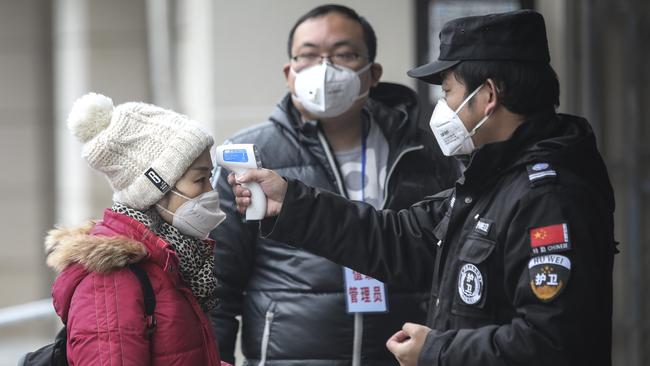Coronavirus: Chinese city of Wuhan locked down to stop spread
Thousands of people rushed to leave the Chinese city of Wuhan before a city lockdown to try to stop the spread of the coronavirus.

Thousands of people rushed to leave the central Chinese city of Wuhan on Thursday before a city-wide lockdown to try to stop the spread of the coronavirus that has killed 17 people, infected 570 more and spread to at least six other countries.
Travellers crammed Wuhan’s airport and central Hankou railway station hours before authorities enforced an indefinite suspension of outbound flights and trains, as well as subway, bus and ferry services. Many more were locked out by security forces as the shutters came down at 10am local time (1pm AEDT).
Long lines of cars also headed out of the city on Thursday, a day before hundreds of millions of people travel across China and abroad for the Lunar New Year celebrations, while many who stayed behind rushed to stockpile food, medicines and fuel.
“Train tickets are not available on travel apps after 23.30pm, so I rushed to the train station and managed to buy a ticket to my hometown in Henan at the ticket window,” a man who gave his name only as Cui told the South China Morning Post before the lockdown. “I don’t want to be locked in this city for one or two months after the ban.”
The unprecedented decision to quarantine a city of about 11 million people was made even as the World Health Organisation delayed an expected health emergency declaration that would trigger a more co-ordinated global response and potentially onerous restrictions on travel and trade.
WHO director general Tedros Adhanom Ghebreyesus said more information was needed before a decision could be made, and an emergency committee would reconvene early on Friday.
“The decision whether or not to declare a public health emergency of international concern is one I take extremely seriously, and one I am only prepared to make with appropriate consideration of all the evidence,” Dr Tedros said in Geneva. “Our team in China is working with local experts and officials to investigate the outbreak.’’
WHO defines a global health emergency as an “extraordinary event” that constitutes a risk to other countries, and requires a co-ordinated international response. Its last declaration was over the Ebola outbreak in the Democratic Republic of Congo last July, 11 months after it was detected and after it had killed 2500 people.
Dr Tedros praised Chinese health authorities for quickly sharing information on the new virus, which has spread across China and into Thailand, South Korea, Hong Kong, Taiwan, Macau, Japan and the US. China’s response to the latest outbreak is vastly different to its behaviour during the 2002 SARS pandemic when it was accused of initially covering up the outbreak that ultimately killed 774 people, infected more than 8000 and cost about $40bn.
Cash-strapped Wuhan has already appealed to Beijing to provide millions of protective suits and face masks that are now mandatory in all public places.
Public health officials are still insisting the Wuhan virus appears milder than SARS, which killed almost one in 10 of its carriers, and that those who have died in the latest outbreak are mostly older patients with underlying conditions such as diabetes or heart disease.
But across Asia, and as far afield as Mexico and the US, authorities are imposing heightened health security measures at airports and check points, including body temperature scanners, disinfectant stalls, and mandatory health declarations.
North Korea has temporarily banned all inbound tour groups, Taiwan has also suspended all travel groups to the city, while Hong Kong said it would turn two holiday camps into quarantine zones for people who had come in contact with the virus.
Australia, Singapore, Indonesia and Britain have issued travel advisories warning their citizens to reconsider all but essential travel to Wuhan. Singapore’s budget Scoot airline has temporarily suspended flights into the city.
Additional reporting: agencies



